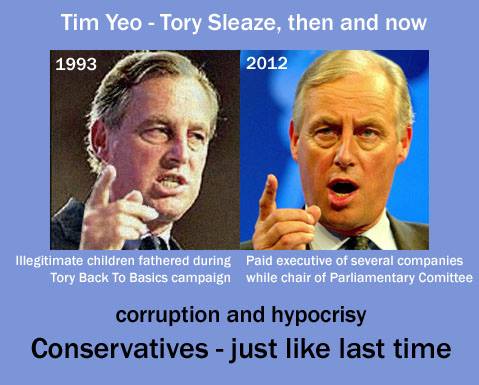How policies are justified is increasingly being detached from the aims and consequences of them, partly because democratic processes and basic human rights are being disassembled or side-stepped, and partly because the current government employs the widespread use of a “malevolent benevolence” type of propaganda to intentionally divert us from the aims and the consequences of their ideologically (rather than rationally) driven policies.
An example of such propaganda is the common use of words such as “support”, “incentives”, “responsibility” and “fairness” to legitimise welfare cuts during a recession and the punitive benefit sanctions regime introduced by the Coalition. (I’ve written at length about this elsewhere on this site).
Furthermore, policies have become increasingly detached from public interests and needs.
Transparency International are a politically non-partisan, independent organisation whose mission is to prevent corruption and promote transparency, accountability and integrity at all levels and across all sectors of society, particularly in governments. Their core values are: transparency, accountability, integrity, solidarity, courage, justice and democracy.
In 2013, Transparency International undertook their annual opinion survey called the Global Corruption Barometer and found 65% of people believed the UK had become more corrupt in the last two years. 90% said British politics is now run by a few “big entities” who were looking after their own interests.
Corruption is defined as the abuse of entrusted power for private gain.
For example, Cameron’s defence secretary, Liam Fox, resigned over his relationship with the lobbyist Adam Werritty, and his election adviser, Lynton Crosby, is a lobbyist – for tobacco, alcohol, oil and gas companies. Which is why the prime minister came under attack for dropping curbs on cigarette packaging and alcohol pricing. His party treasurer Peter Cruddas resigned after offering access to Cameron for a £250,000 party donation.
Corporate influence extends beyond lobbying, though. Corporate and political interests have become increasingly interchangeable and mutual. The Tory party receives over half of its income from bankers, hedge fund and private equity financiers. The Tory party is bankrolled by a few hundred millionaires. We know that Peers who have made six-figure donations have been rewarded with government jobs.
We know that venture capitalists such as Adrian Beecroft have influenced Tory employment policies, and in July, it emerged that millions of pounds of taxpayers’ money is being spent on a venture capital fund overseen by Beecroft, who is one of the Conservative Party’s biggest donors, and head of the private equity group that administers the high profile barely legal loan shark operation Wonga. The Wonga “business model” is basically to prey on the poor, vulnerable and absolutely desperate by offering them exploitative loans at eye-watering interest rates of 5,853% APR. Tellingly, even in the globally renowned haven of free-marketeering – the United States – such outrageous loans are illegal, but in the UK the Tory party are defiantly resisting efforts to regulate the so-called Payday lending sector and introduce maximum APRs.
Following the tide of sleaze and corruption allegations, Cameron “dealt” with with parliamentary influence-peddling by introducing the Gagging Act, which is primarily a blatant attack on Trade Unions (which are the most democratic part of the political funding system) and Labour Party funding, giving the Tories powers to police union membership lists, to make strike action very difficult and to cut union spending in election campaigns.
At least 142 peers linked to companies involved and invested in private healthcare were able to vote on last year’s Health Bill that opened the way to sweeping and corrosive outsourcing and privatisation. Tory MP Patrick Mercer also resigned the party whip when details of yet another lobbying scandal emerged, in May 2013, following questions surrounding paid advocacy, he was an Independent MP representing the constituency of Newark in Parliament until his resignation at the end of April 2014 after the Standards Committee suspended him for six months for “an unprecedented, sustained and pervasive breach of the house’s rules”
The Tories have normalised political corruption and made it almost entirely legal. Our democracy and civic life are now profoundly compromised as a result of corporate and financial power colonising the State.
The Transparency of Lobbying, non-Party Campaigning, and Trade Union Administration Bill is a calculated and partisan move to insulate Tory policies and records from public and political scrutiny, and to stifle democracy. There are many other examples of this government removing mechanisms of transparency, accountability and safeguards to rights and democracy.
Transparency International have flagged up many areas of concern in their report: A mid-term assessment of the UK Coalition Government’s record on tackling corruption.
Here is a list of the main causes for concern, many of which we have reported also:
- There is no coordinated strategy or action plan to combat corruption in the UK. Data on corruption are not currently collected or are subsumed with other data such as fraud.
- There is no strategic plan or clear channels of accountability; this is symptomatic of the lack of coordination surrounding Whitehall’s anti-corruption efforts.
- Resources available to the institutions responsible for fighting corruption have been significantly reduced by the Government. Notably, the Serious Fraud Office’s budget has been cut from £51 million in 2008-9 to £33m in 2012-13. Its budget is expected to fall further to £29m by 2014-15.
- The Government is seeking to amend the Freedom of Information Act to make it easier for authorities to refuse requests on cost grounds.
- This Government is threatening to reduce the access of civil society and others to use judicial review mechanisms.
- Legal Aid is being cut extensively, this is likely to deny access to justice to individuals and groups who are victims of corruption.
- The Government’s Localism Act abolished the Audit Commission, which in addition to overseeing and commissioning audit for local government and other bodies like the NHS, had statutory functions for investigating financial management and value for money. There was insufficient public discussion and consultation on the decision to abolish the Audit Commission and to debate and discuss the alternatives to it.
- The Leveson enquiry and associated criminal investigations revealed a disturbing picture of the cosy relationship between politicians and the media, the bribing of police officers by journalists and the lack of will to hold the media accountable even when laws had clearly been broken. Concentration of media ownership remains a significant corruption risk. The Government has thus far failed to implement the Leveson reforms or any alternative.
- Labour’s Bribery Act has succeeded in encouraging many private companies to implement adequate procedures to combat corruption. However the Coalition has reduced resources for investigation and prosecution.
- The “Generals for hire scandal” in October 2012 suggests that the current system of controls and oversight of movement between the Governmentand the private sector is insufficient. There have been too many similar scandals. In July 2012 the Public Administration Select Committee (PASC) recommended that Advisory Committee on Business Appointments (ACoBA) be replaced by a new, statutory, Conflicts of Interest and Ethics Commissioner. This recommendation has been ignored by the Government.
- The Government has failed to address the problems with Tory political party funding.
- Cash-for-access scandals indicate that donations to the government are a major source of vulnerability to corruption. Current funding rules lead to a lack of public trust in political parties. 42% of voters believe that donations of over £100,000 are designed to gain access and influence over the Tory party.
- It has been estimated that billions of pounds of dirty money is laundered into and through the UK each year. Currently the UK and its Overseas Dependent Territories and Crown Dependencies do not require companies to declare who the ultimate beneficial ownership are of companies and trusts. Action taken against the facilitators and enablers of corruption is inadequate, for example, the lawyers, bankers and accountants that handle corrupt transactions.
Perhaps it is worth a reminder of the Nolan principles, which are The Seven Principles of Public Life. They are included in the Ministerial Code, they were defined by the Committee for Standards in Public Life and they provide the basis of an ethical framework for responsible conduct, expected of those who hold positions in public office. The seven principles of conduct are:
1) Selflessness – Holders of public office should act solely in terms of the public interest. They should not do so in order to gain financial or other benefits for themselves, their family or their friends.
2) Integrity – Holders of public office should not place themselves under any financial or other obligation to outside individuals or organisations that might seek to influence them in the performance of their official duties.
3) Objectivity – In carrying out public business, including making public appointments, awarding contracts, or recommending individuals for rewards and benefits, holders of public office should make choices on merit.
4) Accountability – Holders of public office are accountable for their decisions and actions to the public and must submit themselves to whatever scrutiny is appropriate to their office.
5) Openness – Holders of public office should be as open as possible about all the decisions and actions they take. They should give reasons for their decisions and restrict information only when the wider public interest clearly demands.
6) Honesty – Holders of public office have a duty to declare any private interests relating to their public duties and to take steps to resolve any conflicts arising in a way that protects the public interest.
7) Leadership – Holders of public office should promote and support these principles by leadership and example.
These principles apply to all aspects of public life. The Committee that set them out did so for the benefit of all who serve the public in anyway.
The principles were drawn up in 1995 after previous Tory “sleaze scandals”. Recently, both the Guardian and Huff Post report that the Chairman of the Parliamentary Committee into Standards in Public Life says in a report that: “MPs should be required to undergo an induction course to teach them about the seven principles of public life that are meant to promote openness and honesty.”
He warned the Prime Minister: “that making sure politicians are aware of their duties to be honest, open, accountable and selfless cannot be left to chance”.
The report is part of the committee’s submission to an inquiry being carried out into standards procedure set up amid controversies over the way MPs self-police misconduct in their ranks, notably in the case of the expenses scandal surrounding then cabinet minister Maria Miller.
In 1997, Tony Blair extended the Committee’s terms of reference: “To review issues in relation to the funding of political parties, and to make recommendations as to any changes in present arrangements”.
However, other ethical matters ultimately come under the jurisdiction of the Commons Standards Committee.
The Standards Board for England, branded as Standards for England was sponsored by the Department for Communities and Local Government. Established under Labour’s Local Government Act 2000, it was responsible for promoting and ensuring high ethical standards in local government. It oversaw the nationally imposed Code of Conduct – now abandoned – which covered elected and co-opted members across a range of local authorities. The Standards Board has been abolished by the Coalition. It is now left to local authorities to make and police their own codes of conduct.
Part 1 of the Local Government Act 2000 introduced a power for local authorities in England and Wales to promote the economic, social and environmental well-being of their area. A similar power was introduced in section 20 of the Local Government in Scotland Act 2003. The well-being power in the Local Government Act 2000 was repealed in 2011 with respect to England, and replaced with a provision in the Localism Act. Section 1 (1) of the Act provides that “a local authority has power to do anything that [private] individuals generally may do.” This is called a general power of competence.
The Act was certainly not introduced in an open way which promoted any meaningful debate and participation, it was preceded by no White Paper, the rationale for the Bill was left largely unexplained before its introduction, and although devolution was mentioned a lot, ministers advocating the repeal of the well-being power and its replacement with the somewhat lame general competence power, were rather shorter on concrete explanations as to why the Bill was either necessary or desirable.
The Act will divorce local government from clear and transparent accountability mechanisms, making it difficult for local people to challenge its actions effectively.
There is a clear pattern of alarming and extremely anti-democratic policies formulated by the Coalition that are designed to protect the interests of the very wealthy; to stifle debate; challenges and opposition; to encourage corruption whilst obscuring it; to restrict access to justice for victims of government and corporate corruption; to remove accountability and transparency, and there is an increasing detachment of policies from wider public needs and interests.
Legal equality, freedom and rule of law have been identified as important characteristics of representative democracy since ancient times. More contemporary definitions include: political pluralism; equality before the law; the right to petition elected officials for redress of grievances; due process; civil liberties; human rights – all of these are considered to be crucial criteria for defining liberal democracies.
Since 2010, many of the essential processes and safeguards of democracy have been dismantled: we no longer have a democratic state.
 Pictures courtesy of Robert Livingstone
Pictures courtesy of Robert Livingstone
I don’t make any money from my work. I am disabled because of illness and have a very limited income. But you can help by making a donation to help me continue to research and write informative, insightful and independent articles, and to provide support to others. The smallest amount is much appreciated – thank you.





Reblogged this on sdbast.
LikeLike
Reblogged this on seachranaidhe1.
LikeLike
Reblogged this on Britain Isn't Eating.
LikeLike
Reblogged this on psychjim's Blog
LikeLike